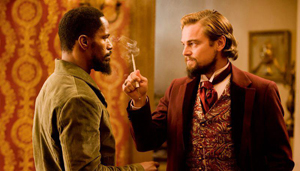‘Django’ a tasteless combination of slavery, comedic gore

January 10, 2013
“Django Unchained”
Directed by: Quentin Tarantino
Starring: Jamie Foxx, Leonardo DiCaprio, Christoph Waltz
Grade: C
It didn’t take long for the first head to explode. Or the next one. Or the one after that.
It also didn’t take long for the gory shock of “Django Unchained” to pass and the deeply problematic filmmaking to show itself.
Director Quentin Tarantino has always mixed violence and humor into a horrifically entertaining cocktail. Films such as the “Kill Bill” series, “Pulp Fiction” and “Inglourious Basterds” have made startling gore a typical hallmark of the famed director’s work. In the newly released “Django Unchained,” however, Tarantino regrettably contaminates this zany violence with slavery — a somber, terrible subject that this film refuses to treat with respect. The juxtaposition of silliness and seriousness combined with poor taste and poorer discipline quickly proves this film to be an uncharacteristic misstep for the controversial filmmaker.
“Django Unchained” tells the story of slave-turned-bounty-hunter Django, played brilliantly by Jamie Foxx, and his epic struggle to free his wife from slavery at the infamous plantation Candie Land. Although the plot is original, the title character is torn from the storied tradition of Spaghetti Westerns, an influence consistently present in Tarantino’s career. The original inspiration, the eponymous protagonist of the 1966 film “Django,” is a recurring character in the genre. Tarantino’s “Django Unchained” is a spiritual successor to “Inglourious Basterds,” but the cleverness and irony that made “Inglourious Basterds” an enjoyable film is obviously lacking in Tarantino’s new release from start to finish.
“Django Unchained” is not sure what it wants to be. On one hand, it’s a comedic jaunt through the world of Spaghetti Westerns — a lost genre — and on the other, it is a sobering look at slavery in the antebellum South. While both concepts would make worthy films in their own right, their inclusion in the same motion picture is a shocking insult to both projects, making the tragic seem light-hearted and turning the humorous into the morally reprehensible.
Few artists have treated slavery fairly on the silver screen, choosing instead to gloss over the depravity and cruelty of the practice for the sake of their dainty film on the Revolutionary War or our founding fathers — slave owners, of course. The great tragedy of this despicable omission is our remarkable ignorance about the darkest, most evil and most heinous period in American history.
Tarantino seems eager to tackle this problem, highlighting with horrible detail the tragedy of slavery. However, the juxtaposition of graphic, comic-inspired violence akin to “Kill Bill” and the somber realism of a slave being torn apart by a pack of dogs is chilling for all the wrong reasons.
This juxtaposition isn’t unfamiliar for Tarantino. After all, his acclaimed film “Inglourious Basterds” followed a similar formula. This genre — vengeance pornography — attempts to instill the audience with cathartic satisfaction as they watch the underdog rise to meet his oppressors. But the characters of “Inglourious Basterds” never tread on the ground of Nazi concentration camps in the way that Django calmly watches fellow slaves killed on screen.
Similarly to those of his other films, Tarantino’s new cast of characters is a colorful set of caricatures, mimicking reality only when useful for the narrative. Christoph Waltz’s remarkable performance as Django’s rescuer and mentor sets the standard for the film’s cast.
This standard, a near-perfect mixture of clever dialogue cleverly delivered, culminates in Leonardo DiCaprio’s sublime performance as Calvin Candie, the film’s central villain. DiCaprio wonderfully portrays Candie’s vile exuberance for slave, or “mandingo,” fighting — his business and pastime — displaying both cries of victory as his slave gouges the eyes of another and stern regret as he orders the death of one of his prized pieces of property.
But Tarantino’s poor discipline ruins even the brilliant acting. Instead of maintaining his usual chipper violence for the sake of narrative and humor, Tarantino can’t help but mix humorous gore and catastrophic atrocity into an unsavory film.
Jonah Hill’s inclusion in the cast as Bag Head No. 2 highlights this problem clearly. Sitting amid a mob of hooded white southerners — a clear allusion to the Ku Klux Klan — bent on killing Django and his partner, Hill’s character comments humorously that he cannot see out of his mask, sparking a conversation on the quality and efficacy of the masks. While this funny sequence certainly serves comic-relief purposes, its tone does not fit in with the film’s other depictions of racism, which tend to be bitterly realistic.
While Django entertains and excites, it is both intellectually and morally bankrupt, characteristics viewers should not tolerate in the work of a self-purported artist. If Tarantino wants to entertain an audience without caring for the ethical implications of his work, then romantic comedy is a genre long starved for a visionary.


